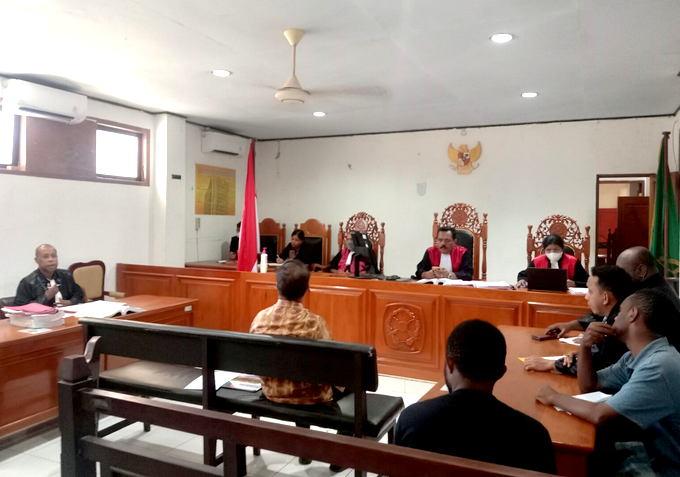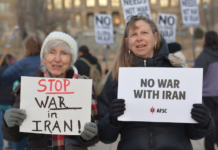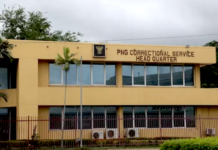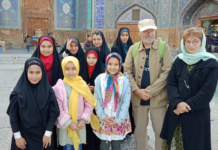
The trial of three Papuan “free speech” students accused of treason has resumed at the Jayapura District Court this week.
The defendants — Yoseph Ernesto Matuan, Devio Tekege, and Ambrosius Fransiskus Elopere — have been charged with treason for organising a free speech rally where they were accused of raising the banned Morning Star flags of West Papuan independence at the Jayapura University of Science and Technology (USTJ) on November 10, 2022.
During the hearing on Thursday, linguist Dr Robert Masreng testified as an expert witness presented by the public prosecutor.
He said the Morning Star flags displayed in the event were “merely an expression”.
The students organised a protest to voice opposition against the Papua dialogue plan initiated by the National Commission on Human Rights (Komnas HAM).
However, the event was broken up by police and several participants were arrested.
Dr Masreng, a faculty member at Cenderawasih University’s Faculty of Teacher Training and Education, clarified the definitions of treason, independence, Morning Star, conspiracy, and the meanings of writings displayed during the free speech rally.
Treason ‘definitions’
He said that according to the Indonesian Thesaurus dictionary, “treason” referred to engaging in deceitful actions or manipulating others to achieve personal objectives.
It could also denote rebellion, expressing a desire to prevent something from happening.
Additionally, Dr Masreng noted that treason could signify an intention to commit murder.
In court, Dr Masreng explained that treason involved deceptive actions, rebellion, and an intention to commit murder.
He emphasised that the Morning Star flag was a symbol that gained meaning when it was used for a specific purpose. Without a clear intention behind its use, the flag lost its importance.
Dr Masreng said that the Morning Star flag was often used as a symbol to express ideas.
He said that the meaning of the flag could be understood based on how it was used in different situations, and different people might interpret it in their own unique ways.
‘Independence’ clarified
Dr Masreng clarified the term “independence” by explaining that it represented a perspective of freedom that had a wide-ranging and abstract significance when it was used.
The understanding of the word relied on the specific situation and how different people perceived it, especially in relation to the core concept of freedom.
Dr Masreng said this meant that when someone expressed themself, it implied being free from criticism and oppression.
He also provided an interpretation of the chant “referendum yes, dialogue no.”
He said the chant conveyed a decision to the general public without involving Parliament.
Rejecting dialogue was an expression of the speaker’s unwillingness to engage in a dialogue.
Regarding the statement requesting intervention of the United Nations Human Rights Council in Papua, Dr Masreng said this signified that the problems in Papua were not limited to domestic concerns, but were matters that should be acknowledged by the international community.
“It means an expression of asking the government to be open to the international community, allowing them to enter Papua and observe the dire human rights situations in the region,” he said.
Republished from Jubi with permission.













































